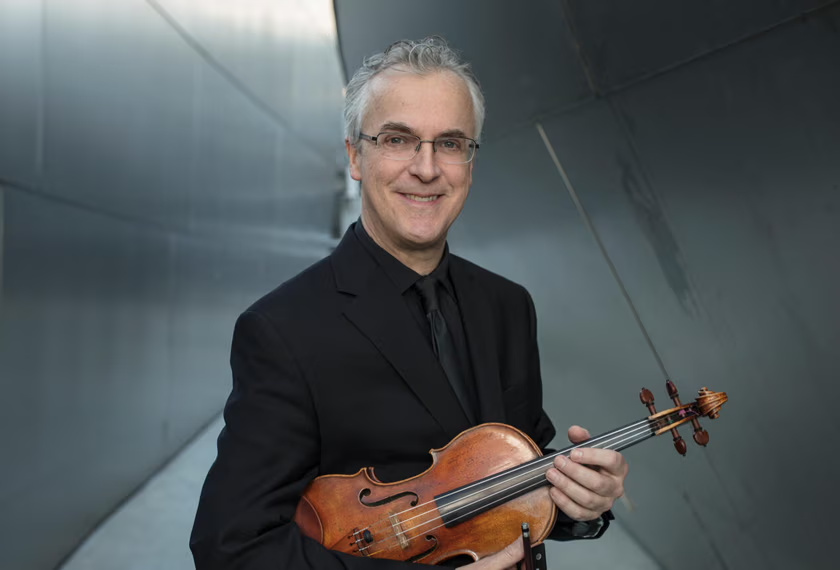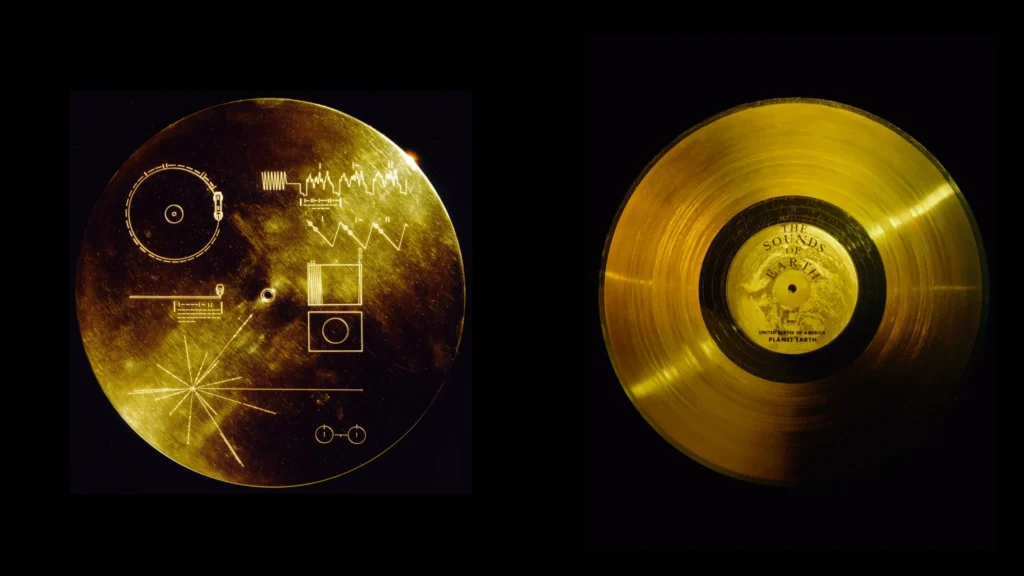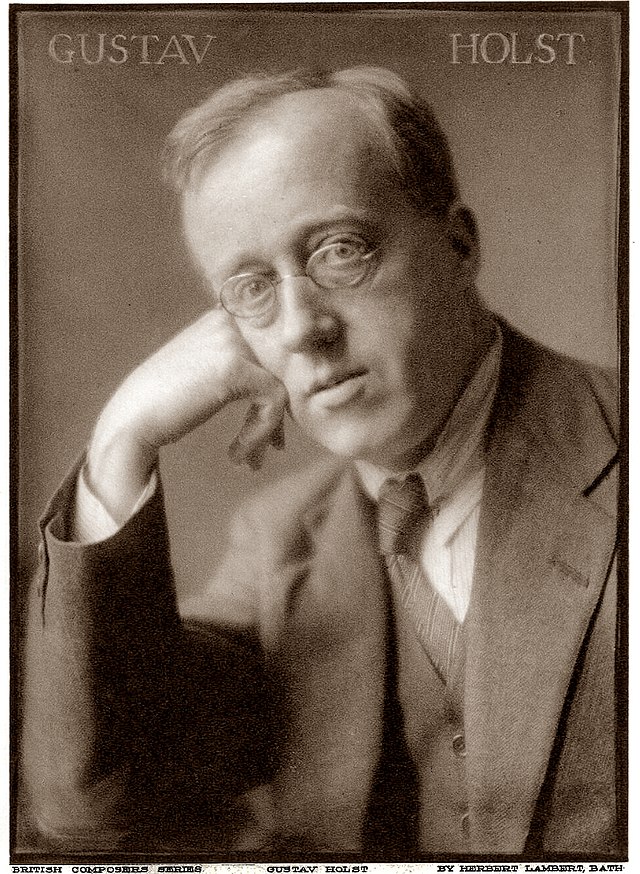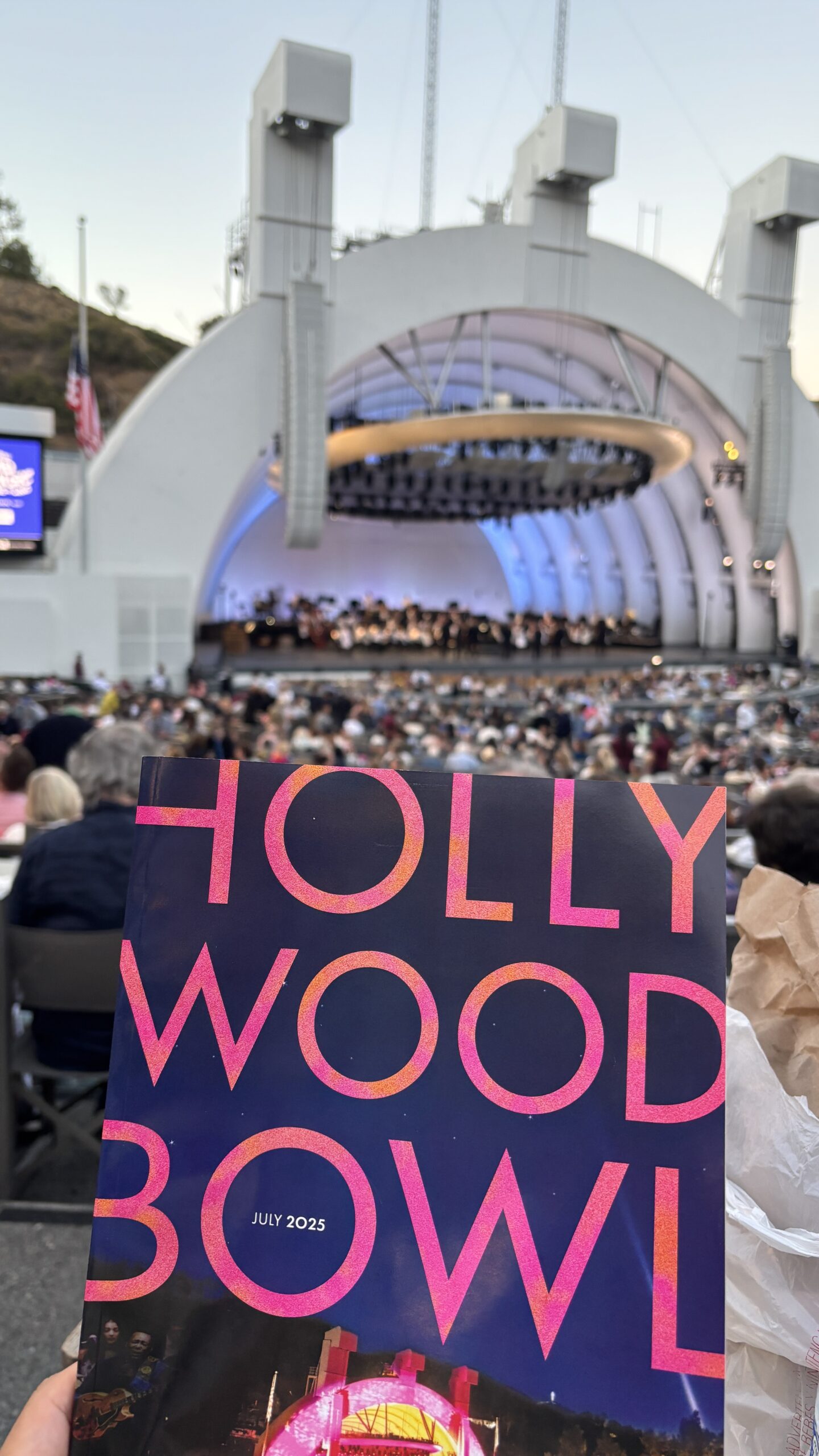By Mi Ran Choi
Celebrated Cellist & Director of Classical Arts, Hollywoodland News
It’s hard to believe that just over 60 years ago, former President John F. Kennedy implored NASA to strive boldly for progress: “For the eyes of the world now look into space, to the Moon, and to the planets beyond.” The world has changed much since the apprehensions that came with the Cold War and the Space Race (for better or for worse—you can be the judge of this), yet a few things remain constant: humankind’s insatiable curiosity for what lies beyond our swiftly tilting planet and we got to experience one moment of that with the Hollywood Bowl Voyager 130 premiere.
Together with HLN’s Vice President of Classical Arts Ioana Istrate, we were treated to an evening of revived childlike wonder underneath the stars with the musicians of the Los Angeles Philharmonic—an evening of music by Daniel Slatkin, Ralph Vaughan Williams, and Gustav Holst. What a treat to end our work week with, over some much-loved Indian food.
A Space Nerd’s Dream at the Hollywood Bowl Voyager 130 Concert
Before music, writing, teaching, and academia, I had a childhood obsession with all things space. There were printed photos of Yuri Gagarin and Laika taped near my desk, along with books on the known universe—their spines creased and worn from heavy use. I regularly daydreamed while flipping through these pages about becoming the first Korean-American in space, a title now held by Lieutenant Commander Jonny Kim.
It was purely serendipitous that my first LA Phil concert was one with my high school’s combined symphony orchestra classes, to watch a narrated performance of Holst’s The Planets at the Walt Disney Concert Hall. Seeing Frank Gehry’s modern, otherworldly marriage of metal, wood, and glass to create the ultimate listening space was breathtaking for my freshman brain to take in. Then came the music: the planets embodied by mythology and astrology, and Holst’s fastidiousness to tone color with a large orchestra.
Upon listening to the second featured planet, Venus: The Bringer of Peace, I felt transported back to my childhood desk, marveling at the first pictures of Earthrise and imagining what Voyager II must be experiencing lightyears from home. To return to this theme 14 years later, full-circle, was an occasion for reflection—but first, the music!
Leonard Slatkin Leads the LA Phil at the Hollywood Bowl Voyager 130 Premiere
Conductor and fellow LA native Leonard Slatkin (also a birthday twin and fellow Los Angeles City College alum) was at the helm of the orchestra that night, guiding with sensitive attention to balance and color.
He opened the concert by announcing that the night also doubled as the introduction of the fourth generation of the Slatkin/Zlotkin family to be featured at the Hollywood Bowl, with the premiere of his son Daniel Slatkin’s work Voyager 130.

Leonard Slatkin’s career began with his debut with the New York Youth Symphony in 1966, and since then, he has collaborated far and wide. He worked most notably with the San Francisco Symphony, Washington D.C.’s National Symphony, the BBC Symphony, the LA Phil, the Detroit Symphony, and the Nashville Symphony—where he currently serves as Music Advisor.

If you thought his contributions stopped at conducting, I have some exciting news. He remains active as an educator and published author! He has a series of videos on teaching orchestral conducting principles available freely on YouTube, as well as books covering topics from Conducting Business to deep-dives into masterworks of the last two centuries. Should any of these topics interest you, I highly recommend checking them out.
A small aside: Mr. Slatkin also maintains an active Instagram presence and regularly shares fun, interesting, or straight-up bizarre album covers from the last century. You never know what you’ll find or learn about vintage experimental album art.
Daniel Slatkin’s Hollywood Bowl Voyager 130 Premiere
Primarily a film and TV score composer, Daniel Slatkin was challenged to write for the concert hall by his partner in 2022. A Beethovenian at heart, Slatkin found inspiration in Beethoven’s Cavatina from String Quartet No. 13, Op. 130.

A recording of this work was included on the Voyager Golden Record, an album crafted for both Voyager spacecrafts, launched in 1977. Intended as a space version of a message in a bottle, the record contains samplings of life on Earth in both visual and auditory forms. Inspired by the spacecrafts’ sojourn into the deep unknown, Slatkin composed a work of his own.
He captured every stage of a rocket’s launch with exacting detail, expressed through extended techniques and programmatic orchestration. A lone oboe embodied the Voyagers’ communication systems, blipping sporadic staccato G’s as bookends to the evocative work while the orchestra built momentum toward liftoff.
The most moving portion of the evening was hearing how Slatkin wove in his Beethovenian influence, quoting the Cavatina with a twist. On the Bowl’s sound system, recorded greetings in 55 different languages from the Voyager Golden Record enveloped a live string quartet solo in beautiful synergy between recorded and live sound.
This peaceful collaboration, born during Space Race tensions, still resonates today.

While new geopolitical tensions have replaced the Cold War, one thing has endured: human curiosity and the universal desire for unity. As Simonetta di Pippo, Director of the UN Office for Outer Space Affairs, said, “The undertaking of the Voyager project reminds us of who we are, where we came from, and that we should treat each other with care.”
A Lark Ascending at the Hollywood Bowl Voyager 130 Concert
The theme of ascent and journeying forward continued with Ralph Vaughan Williams’ The Lark Ascending, arranged for solo violin and orchestra.
The soloist of the night was the LA Phil’s Principal Concertmaster Martin Chalifour, a violinist of the highest caliber and LA-based educator at both CalTech and USC. Chalifour, who holds the orchestra’s record for longest-serving concertmaster, announced his retirement last October following the 2024–25 season.

In a way, the piece served as his “swan song” with the LA Phil—but he is far from slowing down, with scheduled performances near and far already planned. Should you find an opportunity to hear him live, I cannot recommend strongly enough that you do.
Based on a poem by George Meredith, the piece sets a lone lark (the violin) soaring above the idyllic backdrop painted vividly by the orchestra and the salmon-pink lights of the Bowl. Chalifour’s violin projected with lyrical clarity through the richly voiced orchestra, breathing life into the music with silences and zephyr-like phrasing. Slatkin, conducting with his hands instead of a baton, sculpted the nuances of sound with delicate precision.
Holst’s The Planets and the Hollywood Bowl Voyager 130 Performance

Now, for The Planets. HLN’s Ioana may have mentioned in the past that the Bowl engineer responsible for lights deserves special praise—I could not agree more.
With every planet came a new visualizer gradient as the backdrop. From the pale red of Mars: The Bringer of War to the vivid purple of Neptune: The Mystic, all Bowl musicians and staff collaborated seamlessly to embody each astrological character (excluding Earth and Pluto).
The soli in Venus: The Bringer of Peace and Saturn: The Bringer of Old Age are my personal “make-or-break” moments, and the musicians exceeded expectations with warm sensitivity. Even Jupiter, which I’d heard ad nauseam in high school orchestra, felt fresh and energetic.
Lingering Thoughts on the Hollywood Bowl Voyager 130 Concert
The ending of the final movement, Neptune: The Mystic, brought back the same chills I felt during Voyager 130.
As the off-stage upper voice chorale charged the audience with an ethereal benediction into the great unknown (or in our case, post-concert North Hollywood traffic), the image of a lone wanderer leaving home re-entered my mind.
Later that evening, I realized why. I remembered the 1972 Soviet psychological sci-fi film Solaris, based on Stanisław Lem’s novel, which I loved around the same time as my first visit to the Phil. Beyond the theme of space, I recalled one line from the plot: “We don’t need other worlds. We need mirrors.”

I mention this not to dissuade support for space exploration, but as a call to action. The Voyager Golden Record reminds us that, alongside our hopes for peace and friendship with other possible life forms, there is an even greater need for such warmth closer to home. I hope our readers take the opportunity to listen to these pieces and to feel this call to action as well—to remember our common ground as we set our vision to the stars above.


Leave a Reply